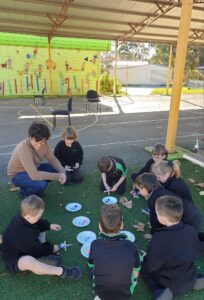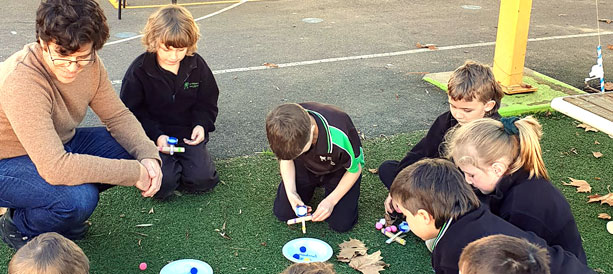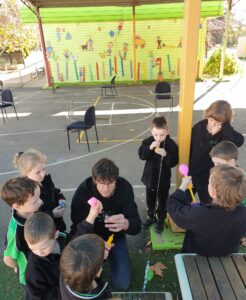
Research Fellow Dr Ivan Herrera (Swinburne University of Technology) assists students with catapult experiments
Following on from FLEET’s previous trip to the western districts in May, Centre outreach coordinator Jason Major and COO Tich-Lam Nguyen visited Horsham College north of the Grampians to engage year 7 students and pilot-test FLEET’s Forces and Energy workshop.
The budding scientists (all 170 of them) built catapults and balloon rockets to explore Newton’s 2nd and 3rd laws and learned a bit about FLEET’s research to develop low-energy electronics.
“In-school visits by scientists helps address rural and remote students’ lack of easy access to STEM resources such as museums, science centres and lab tours,” says Jason Major.
“These rural workshops help rural students engage with working scientists and do hands-on science. It facilitates a dialogue that engaging students’ curiosity and exposes them to a greater breadth and depth of career opportunities in STEM and a deeper understanding of what real scientists do.”
As well as exposing the students themselves to scientific experimentation, the experience was equally valuable for FLEET.
“It was as much a learning curve for me as for the students!” says Jason. “The very first day exposed the flaws in the workshop design.”
Previously FLEET has run the Forces and Energy workshop with younger, primary school, students from years 3-5 where the focus was more on what happens and why.
This was the first time FLEET has taken the workshop to year 7 students, introducing scientific rigour and math to add some quantitative evidence to support their observations.
The Horsham College teachers proved invaluable in adapting the plan to the older students, helping identify where the content and student tasks proved either unworkable in the workshop context (ie, very large student numbers) or too difficult – where students were unfamiliar with some of the data collection methods and math.
“The teachers’ knowledge of their students guided their suggestions of more-effective ways to help students learn the basic physics underpinning their activities, and ways to engage students’ critical thinking,” says Jason.
“For example, one thing I noticed is that primary-aged students who had done this workshop appeared more willing to raise their hand and give their opinion. This willingness seems to disappear in high school. We had to rethink how we got the year 7 students to contribute to the evaluation and we have some new ideas to test the critical thinking activities for the next workshops for this age group.”
“Regardless, we did receive some interesting thoughts in the critical thinking exercises on how we should reduce reliance on digital technologies, including switching off social media and riding our bikes. The former surprised me.”
Analysis of the evaluation data will hopefully provide greater insight into the impact of FLEET’s engagement with these students,” says Jason.


